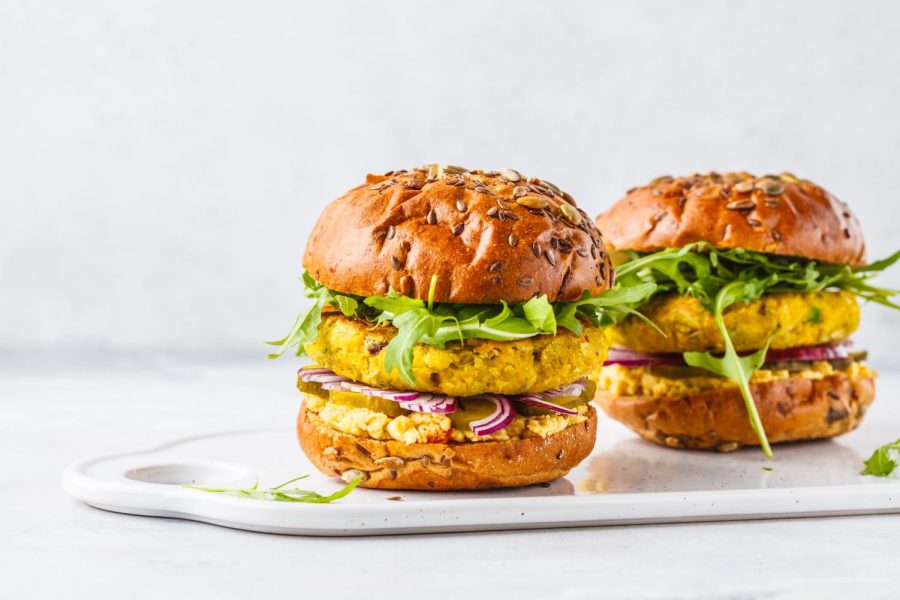Go meatless at the next drive-thru
Two vegan chickpea burgers sitting on a platter. Columnist Lucy Atkinson suggests taking a chance on vegan options when eating at fast-food chains.
April 5, 2023
Many fast-food chains are expanding the meatless (yet meaty) options on their menus, and as consumers, we should be buying them.
Recent years have found vegetarianism in America to be on the rise. In fact, according to a series of national surveys conducted by the Vegetarian Resource Group in 2016, 2019 and 2020, 6% of American adults are vegetarian and 54% of American adults always or sometimes eat vegetarian meals when eating out.
In a rush to accommodate this rise of vegetarianism, many popular fast-food chains have begun expanding their meatless menus – at least, offering vegetarian alternatives beyond the “garden salad, hold the chicken.”
Particularly, fast-food chains have been embracing companies such as Beyond Meat and Impossible, which mimic the flavor and texture of real meat.
In 2019, Burger King became the first popular fast-food chain in America to implement the Impossible Burger (or the Impossible Whopper) into its menu.
More recently, Panda Express re-introduced its Beyond orange chicken in September 2022, and Chick-fil-A began testing its cauliflower-chicken sandwich in select locations on Feb. 13.
Excited by this trend are Anton Skretta and Mylan Engel, the president and faculty advisor of NIU’s VEG club. VEG raises awareness for the benefits of vegetarian and vegan lifestyles. With the rate that climate change is progressing, decreasing global meat consumption will be critical to reducing greenhouse-gas emissions.
“When you say there are inefficiencies in the food system, I think people don’t realize just how great those inefficiencies are,” Engel said. “It takes 13 pounds of grain to produce one pound of beef … But you also have to look at what goes into growing all those crops, so you have to use all the fossil fuels needed to plant those crops … We’re pumping in 13 times more pesticides and herbicides into the environment than we need to, to be producing all of that food … All of that counts towards the carbon footprint.”
VEG also advocates against the unethical side of consuming meat.
“Consuming animal products is attached to a truly staggering quantity of unnecessary suffering in the world, and we have the power to completely get rid of all that … simply by changing what we eat,” Skretta said.
The playing field for going meatless, however, is not even across all cultures, income levels and ways of life. The persistence of food deserts, systemic barriers in marginalized communities and the capitalistic economy of America ensure this.
Especially for those in places of privilege, it’s important to keep these factors in mind and advocate for vegetarianism from a compassionate standpoint.
As noted by Skretta, animal, environmental and human justice are very closely intertwined.
“By continuing to purchase animal products at the rate that we always have… we’re actually harming those… marginalized groups of people to a disproportionate extent,” Skretta said. “In fact, there are recent studies that show that speciesism… is positively correlated with racism, sexism, homophobia and right-wing authoritarianism… These two sets of concerns, animal rights and human rights, are very much aligned with each other.”
Increasing accessibility to and normalizing conversations about the benefits of eating less meat will be necessary to make progress in our inequitable society.
In fact, VEG’s Meatless Mondays campaign, which will last through April, is actively expanding meatless options at NIU’s Neptune and Patterson dining halls.
According to a 2013-2016 CDC study, nearly 40% of American adults consume fast-food on a given day. Thus, to see meatless options increasing in the fast-food sector is extremely encouraging for vegetarians and environmental advocates across the nation.
As consumers in a capitalist society – which is our unfortunate reality – if we intend for these meatless items to remain, we must purchase them.
If fast-food chains don’t see meatless items bringing in a profit, mock meat options won’t last on their menus – options which could have incredible benefits for the planet, for our animal friends, and for normalizing meatless diets. Up to give it a bite?



